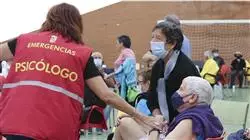University certificate
Scientific endorser

The world's largest faculty of psychology”
Introduction to the Program
A program that highlights the importance of psychosocial support based on comprehensive knowledge of the best strategies and therapeutic techniques to manage specific situations"

The serious mental sequelae that an emergency situation can leave victims with, underscore the importance of psychological first aid. The stress or the state of shock generated by an unexpected event (an accident, a disaster, a sudden death, etc.) causes a disturbance of the cognitive-behavioral system, leading to the appearance of anxiety, personality disorders, depression or behavioral disorders. For this reason, the immediate specialist intervention must be made available, guaranteeing the adequate management of the situation in accordance with the emotional environment and acting to diagnose and prevent the appearance of potential post-traumatic sequelae.
TECH Global University has developed this Professional master’s degree in Emergency Psychology in order to guide professionals in improving their skills for effective involvement in such situations. It is a program comprising 1,500 hours of the best theoretical, practical and supplementary material, through which students will be able to build exhaustive knowledge of therapeutic strategies tailored to a range of crisis contexts and the specific needs of victims.
They will be able to explore the importance of psychosocial support, as well as the human reaction to stress, after been involved in a critical situation. They will also examine the latest first aid protocols and strategies for management of anxious states in patients and the prevention of sequelae. Finally, they will acquire broad and detailed knowledge of the most innovative group techniques to intervene with first responders.
This 100% online degree, designed by experts from different areas of emergency healthcare, is an ideal way to perfect basic psychological first aid skills over 12 months of professional development. Furthermore, in order to guarantee an academic experience fully tailored to the needs of students, there are no schedules or face-to-face classes, and students will be able to connect to the Virtual Campus through any device with an Internet connection.
With this Professional master’s degree, you will perfect your skills in the effective management of Emergency Psychology”
This Professional master’s degreein Emergency Psychology contains the most complete and up-to-date scientific program on the market. The most important features include:
- The development of practical cases presented by experts in Emergency Psychology
- The graphic, schematic, and practical contents with which they are created, provide scientific and practical information on the disciplines that are essential for professional practice
- Practical exercises where self-assessment can be used to improve learning.
- Its special emphasis on innovative methodologies
- Theoretical lessons, questions to the expert, debate forums on controversial topics, and individual reflection assignments
- Content that is accessible from any fixed or portable device with an Internet connection
In the Virtual Campus, you will find clinical cases based on real emergency situations, in which you will have to apply the theory in a practical way, facilitating the assimilation of information in a natural way"
The program’s teaching staff includes professionals from the sector who contribute their work experience to this educational program, as well as renowned specialists from leading societies and prestigious universities.
Its multimedia content, developed with the latest educational technology, will allow professionals to learn in a contextual and situated learning environment, i.e., a simulated environment that will provide immersive education programmed to prepare in real situations.
The design of this program focuses on Problem-Based Learning, by means of which professionals must try to solve the different professional practice situations that are presented to them throughout the academic year. For this purpose, the student will be assisted by an innovative interactive video system created by renowned and experienced experts.
You will explore the concept of stress and the human response to it in order to provide appropriate psychological support"

A multidisciplinary and dynamic Professional master’s degree, perfect to update your knowledge in psychological first aid and first aid protocols"
Why study at TECH?
TECH is the world’s largest online university. With an impressive catalog of more than 14,000 university programs available in 11 languages, it is positioned as a leader in employability, with a 99% job placement rate. In addition, it relies on an enormous faculty of more than 6,000 professors of the highest international renown.

Study at the world's largest online university and guarantee your professional success. The future starts at TECH”
The world’s best online university according to FORBES
The prestigious Forbes magazine, specialized in business and finance, has highlighted TECH as “the world's best online university” This is what they have recently stated in an article in their digital edition in which they echo the success story of this institution, “thanks to the academic offer it provides, the selection of its teaching staff, and an innovative learning method aimed at educating the professionals of the future”
A revolutionary study method, a cutting-edge faculty and a practical focus: the key to TECH's success.
The most complete study plans on the university scene
TECH offers the most complete study plans on the university scene, with syllabuses that cover fundamental concepts and, at the same time, the main scientific advances in their specific scientific areas. In addition, these programs are continuously being updated to guarantee students the academic vanguard and the most in-demand professional skills. In this way, the university's qualifications provide its graduates with a significant advantage to propel their careers to success.
TECH offers the most comprehensive and intensive study plans on the current university scene.
A world-class teaching staff
TECH's teaching staff is made up of more than 6,000 professors with the highest international recognition. Professors, researchers and top executives of multinational companies, including Isaiah Covington, performance coach of the Boston Celtics; Magda Romanska, principal investigator at Harvard MetaLAB; Ignacio Wistumba, chairman of the department of translational molecular pathology at MD Anderson Cancer Center; and D.W. Pine, creative director of TIME magazine, among others.
Internationally renowned experts, specialized in different branches of Health, Technology, Communication and Business, form part of the TECH faculty.
A unique learning method
TECH is the first university to use Relearning in all its programs. It is the best online learning methodology, accredited with international teaching quality certifications, provided by prestigious educational agencies. In addition, this disruptive educational model is complemented with the “Case Method”, thereby setting up a unique online teaching strategy. Innovative teaching resources are also implemented, including detailed videos, infographics and interactive summaries.
TECH combines Relearning and the Case Method in all its university programs to guarantee excellent theoretical and practical learning, studying whenever and wherever you want.
The world's largest online university
TECH is the world’s largest online university. We are the largest educational institution, with the best and widest online educational catalog, one hundred percent online and covering the vast majority of areas of knowledge. We offer a large selection of our own degrees and accredited online undergraduate and postgraduate degrees. In total, more than 14,000 university degrees, in eleven different languages, make us the largest educational largest in the world.
TECH has the world's most extensive catalog of academic and official programs, available in more than 11 languages.
Google Premier Partner
The American technology giant has awarded TECH the Google Google Premier Partner badge. This award, which is only available to 3% of the world's companies, highlights the efficient, flexible and tailored experience that this university provides to students. The recognition as a Google Premier Partner not only accredits the maximum rigor, performance and investment in TECH's digital infrastructures, but also places this university as one of the world's leading technology companies.
Google has positioned TECH in the top 3% of the world's most important technology companies by awarding it its Google Premier Partner badge.
The official online university of the NBA
TECH is the official online university of the NBA. Thanks to our agreement with the biggest league in basketball, we offer our students exclusive university programs, as well as a wide variety of educational resources focused on the business of the league and other areas of the sports industry. Each program is made up of a uniquely designed syllabus and features exceptional guest hosts: professionals with a distinguished sports background who will offer their expertise on the most relevant topics.
TECH has been selected by the NBA, the world's top basketball league, as its official online university.
The top-rated university by its students
Students have positioned TECH as the world's top-rated university on the main review websites, with a highest rating of 4.9 out of 5, obtained from more than 1,000 reviews. These results consolidate TECH as the benchmark university institution at an international level, reflecting the excellence and positive impact of its educational model.” reflecting the excellence and positive impact of its educational model.”
TECH is the world’s top-rated university by its students.
Leaders in employability
TECH has managed to become the leading university in employability. 99% of its students obtain jobs in the academic field they have studied, within one year of completing any of the university's programs. A similar number achieve immediate career enhancement. All this thanks to a study methodology that bases its effectiveness on the acquisition of practical skills, which are absolutely necessary for professional development.
99% of TECH graduates find a job within a year of completing their studies.
Professional Master's Degree in Emergency Psychology
The unpredictable nature of circumstances is fuel for all kinds of reactions: from the most tenuous and transient to those that become a real obstacle to the stability of the psyche. It is the latter that require the greatest attention from psychologists, whose handling, in many cases, falls short in the face of borderline emotional manifestations that derive from chaotic situations. In response to this need, TECH Global University has developed its Professional Master's Degree in Emergency Psychology: a program of twelve thematic modules, supervised by professionals with extensive experience in the field, which aims to provide students with the essential tools and skills to provide professional support to individuals going through extreme calamity situations. With our Professional Master's Degree you will incorporate into your therapeutic methodology, whatever your model, the indispensable guidelines to address the psychological complexities inherent to exogenous cause-effect patterns that have so much interference in daily life and that, channeled in the right way, you can turn into engines of resilience.
Captivate yourself and be the driver of change in difficult times
Social crises and catastrophes are no stranger to the world's timeline. Throughout 2020 and part of 2021, the coronavirus pandemic not only severely affected the health of millions of people, but was also the epicenter of a psychosocial surge where anxiety and stress patterns prevailed on a massive scale. In this regard, a group of experts from the University of Ottawa University in Canada reported significant increases in cases of insomnia, post-traumatic stress disorder, depression and anxiety in a report published in the journal Psychiatry Research. Never before has the need for professionals in the field of psychology been so vast. Future socioeconomic changes and upheavals that may cause new crises demand to be trained for these challenges. With our graduate program, you will be prepared precisely to guide all those whose mental health is violated by these emergency factors, causing a transformative impact on many lives. Our innovative online learning method, free of fixed schedules and with rich interactive material, is your opportunity to become a true agent of change.







